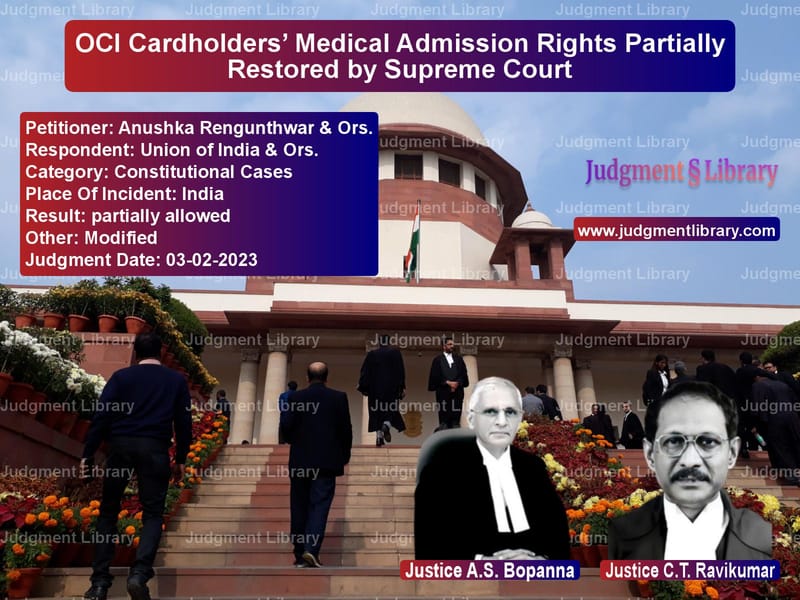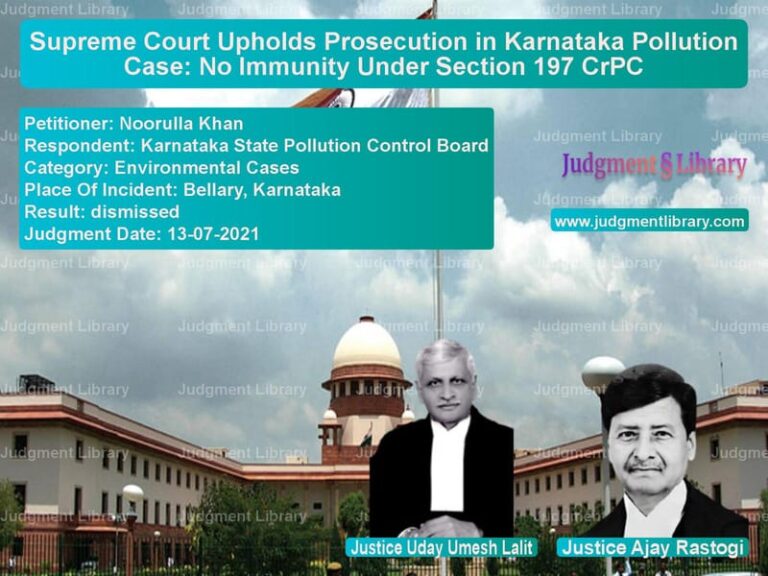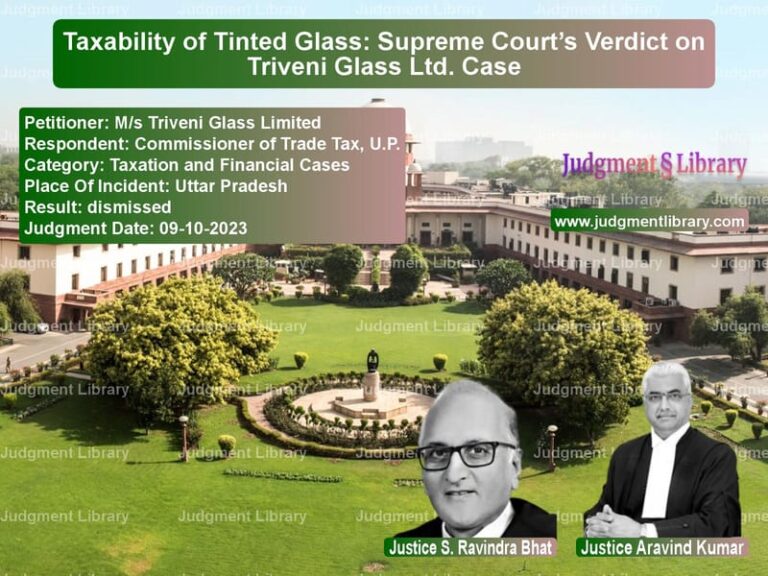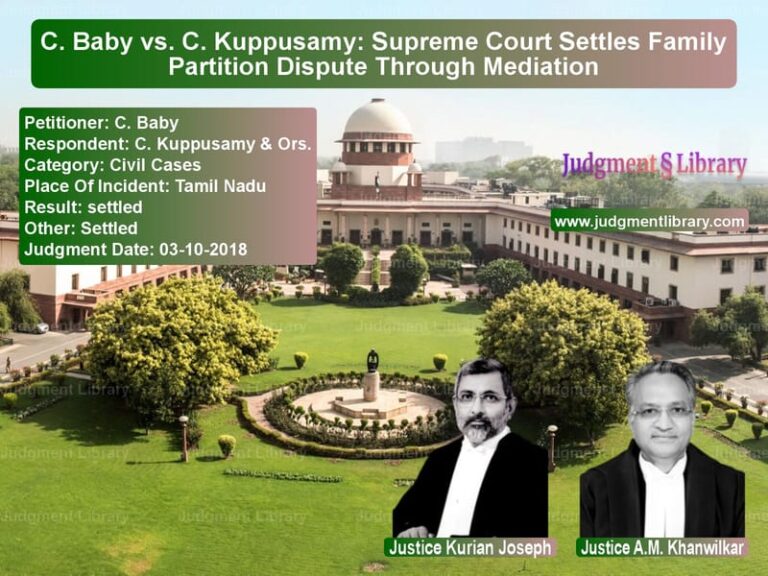OCI Cardholders’ Medical Admission Rights Partially Restored by Supreme Court
The Supreme Court of India, in its judgment dated February 3, 2023, ruled on a significant case concerning the rights of Overseas Citizens of India (OCI) in securing admission to medical courses in India. The case, Anushka Rengunthwar & Ors. vs. Union of India & Ors., addressed the impact of a 2021 government notification that restricted OCI cardholders from competing for medical seats with Indian citizens. The Court partially struck down the retrospective impact of the notification, ensuring that students who had already planned their education in India could continue to enjoy the rights they had before the notification’s issuance.
Background of the Case
Prior to 2021, OCI cardholders were granted parity with Non-Resident Indians (NRIs) in various aspects of education, including appearing for national-level entrance exams such as NEET. They were treated similarly to Indian citizens in the selection process for medical seats. However, a notification issued on March 4, 2021, changed this, restricting OCIs to only NRI quota seats or supernumerary seats and barring them from competing with Indian citizens.
This sudden policy change prompted multiple writ petitions by OCI students who had completed their education in India and were preparing for medical entrance exams under the previous rules. They contended that the government had arbitrarily withdrawn their right to participate in the selection process alongside Indian citizens, affecting their career prospects.
Arguments by the Petitioners (OCI Students)
- OCI students had been granted educational rights under previous government notifications, ensuring parity with NRIs for admissions.
- Many of them had studied in India since childhood and had no practical connection with their country of birth, making their exclusion from the general admission process unfair.
- The sudden change violated the doctrine of non-retrogression, which prevents the withdrawal of rights already granted.
- It also violated Article 14 (Right to Equality) and Article 21 (Right to Life) of the Constitution, as it discriminated against OCI students without a rational basis.
- The argument that OCI students were taking away seats from Indian citizens was factually incorrect, as data from previous years showed that seats often went vacant even with their participation.
Arguments by the Respondents (Union of India)
- The government justified the policy change by stating that OCI cardholders are foreign nationals and should not compete with Indian citizens for limited medical seats.
- As per the Citizenship Act, 1955, OCIs do not have the same rights as Indian citizens and can only claim privileges extended through executive notifications.
- The March 4, 2021 notification was aimed at protecting Indian citizens’ rights to medical education, ensuring that limited seats were available primarily to them.
- Any privilege granted to OCIs was a matter of government policy, which could be altered as per sovereign discretion.
- OCIs could still apply under the NRI quota, which was a privilege and not a right.
Supreme Court’s Observations and Judgment
The Supreme Court acknowledged the government’s power to regulate the rights of OCI cardholders but emphasized that any withdrawal of existing rights must be done with due consideration. Key observations from the judgment include:
“The impugned notification dated 04.03.2021, though competent under Section 7B(1) of the Citizenship Act, 1955, suffers from the vice of non-application of mind and, despite being prospective, is in fact ‘retroactive,’ taking away the rights which were conferred as a matter of policy.”
The Court ruled that:
- The March 4, 2021 notification cannot apply retroactively to OCI students who had already been preparing for admission under the previous policy.
- Such students must be allowed to continue participating in medical admissions under the old rules.
- For future OCI applicants, the new policy can apply prospectively to those born after the notification’s issuance.
- The government must exercise due care when making policy changes affecting students who have already structured their education based on existing rules.
Key Takeaways from the Judgment
- Protection of Existing Educational Rights: The Court safeguarded the rights of students who had invested years in education based on previous policies.
- Limited Government Discretion: While the government has the authority to modify OCI privileges, such changes must be fair and reasonable, ensuring they do not arbitrarily disrupt students’ futures.
- Judicial Review of Policy Decisions: The judgment affirms that courts can intervene when a policy change is arbitrary or unfairly applied to those who had legitimate expectations.
Implications of the Judgment
The ruling ensures that OCI students who had already committed to studying in India are not unfairly excluded from medical admissions. However, it also sets a precedent that future OCI students must abide by policy changes, reinforcing the government’s right to regulate educational privileges for non-citizens.
Conclusion
The Supreme Court’s decision in this case strikes a balance between the government’s sovereign powers and the protection of students’ rights. By preventing retroactive application of the new admission policy, the Court has upheld principles of fairness while allowing the government to set its policy for future OCI applicants. This judgment serves as a reminder that policy decisions impacting education must be carefully considered to avoid undue hardship on affected students.
Petitioner Name: Anushka Rengunthwar & Ors..Respondent Name: Union of India & Ors..Judgment By: Justice A.S. Bopanna, Justice C.T. Ravikumar.Place Of Incident: India.Judgment Date: 03-02-2023.
Don’t miss out on the full details! Download the complete judgment in PDF format below and gain valuable insights instantly!
Download Judgment: anushka-rengunthwar-vs-union-of-india-&-ors-supreme-court-of-india-judgment-dated-03-02-2023.pdf
Directly Download Judgment: Directly download this Judgment
See all petitions in Fundamental Rights
See all petitions in Public Interest Litigation
See all petitions in Judgment by A. S. Bopanna
See all petitions in Judgment by C.T. Ravikumar
See all petitions in partially allowed
See all petitions in Modified
See all petitions in supreme court of India judgments February 2023
See all petitions in 2023 judgments
See all posts in Constitutional Cases Category
See all allowed petitions in Constitutional Cases Category
See all Dismissed petitions in Constitutional Cases Category
See all partially allowed petitions in Constitutional Cases Category







